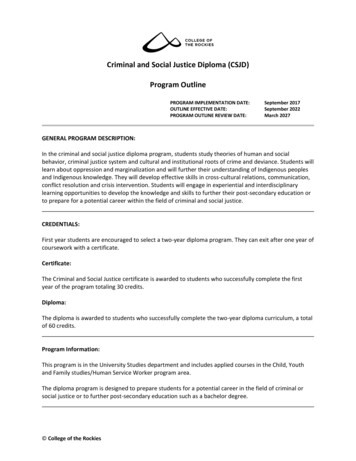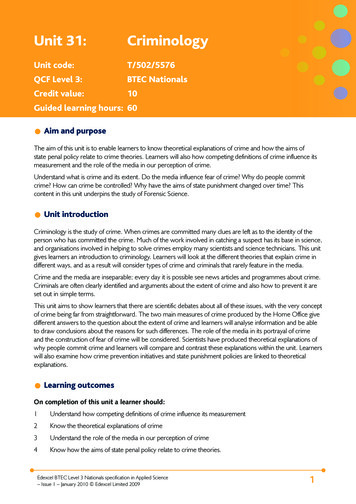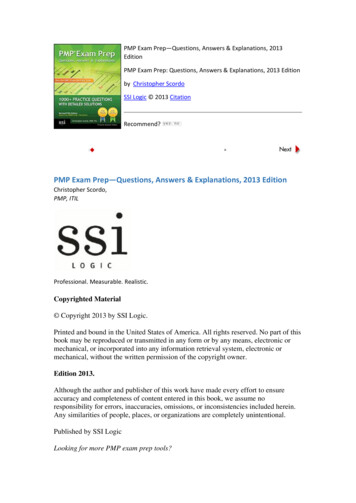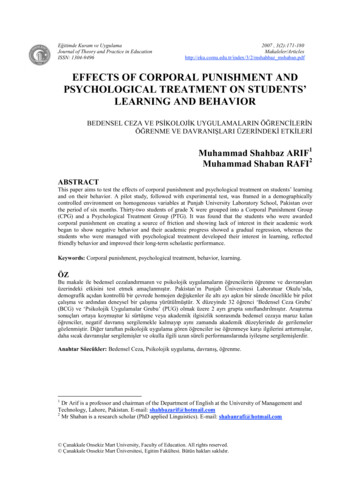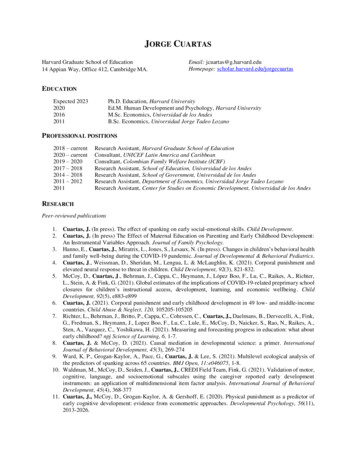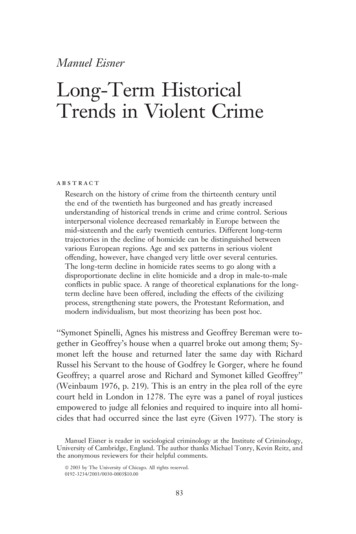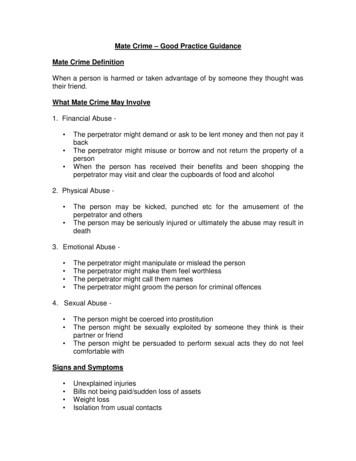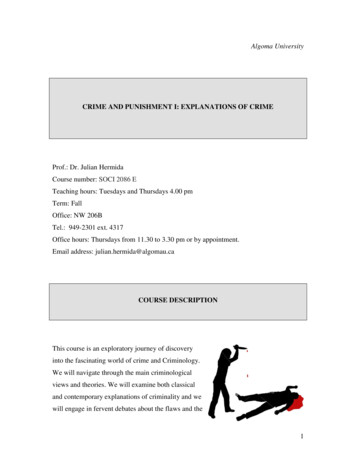
Transcription
Algoma UniversityCRIME AND PUNISHMENT I: EXPLANATIONS OF CRIMEProf.: Dr. Julian HermidaCourse number: SOCI 2086 ETeaching hours: Tuesdays and Thursdays 4.00 pmTerm: FallOffice: NW 206BTel.: 949-2301 ext. 4317Office hours: Thursdays from 11.30 to 3.30 pm or by appointment.Email address: julian.hermida@algomau.caCOURSE DESCRIPTIONThis course is an exploratory journey of discoveryinto the fascinating world of crime and Criminology.We will navigate through the main criminologicalviews and theories. We will examine both classicaland contemporary explanations of criminality and wewill engage in fervent debates about the flaws and the1
advantages of the main criminological theories. We will also explore the Criminal Codeand we will immerse in the captivating task of defining crime. We will also examine theprincipal types of crime and methodological problems in the quantification of crime. Thiscourse will provide you with a sound basis for further study in the area of Criminologyand Criminal Justice.PREMISESCONCEPT OF KNOWLEDGE AND LEARNING Knowledge is a constantly evolving process, which can be produced personallyand collectively. From an individual perspective, knowledge is personal, socially and historicallycontextualized, and dependent on psychological variables. From the class perspective, knowledge is a collective production, where allparticipants can make their contribution. In the process of producing knowledge, there is a dialectic relationship betweenaction and reflection, where one feeds the other and vice versa. Successful learning is based on a personal involvement of students in their ownlearning. The learning environment, including the teaching methods, the teacher’s attitude,and the class atmosphere, among other factors, is determinative of the students’approach to learning, as well as, the learning outcomes. The role of the teacher is that of a facilitator and tutor rather than a lecturer. Student peers are a powerful source of learning. Evaluation is conceived mainly as formative.2
LEARNING OBJECTIVESThis course is conceived so that you can: critically evaluate the major criminological theories.o be familiar with the major schools of criminology.o analyze the main theories of crime. understand the fundamental concepts in criminologyo understand the basic concepts, topics, issues, and terminology used bycriminologists.o be familiar with problems for data collection. be familiar with the Criminal Law notion of crimeo examine the theory of offence. examine the main types of crimes and crime patterns.o critically evaluate the implications of the criminalization of selectedbehaviour. acquire academic skills necessary to succeed at the university.o Develop skills necessary to present oral arguments on criminologicalissues.o Learn to read academic texts.o Learn the interpersonal skills needed to work successfully in a smallgroup.o dinCriminology.3
LEARNING OUTCOMESUpon successful completion of this course, you will be able to: Describe the concepts of crime and Criminology. Explain the main theories of crime causation. Apply criminological theories to a myriad of contemporary criminal problems. Critically reflect on media reports and cultural products concerning crime andcriminality. Determine whether a certain conduct constitutes a crime or not in Canada. Communicate effectively, both orally and in writing, basic criminologicalarguments.METHODOLOGYClassroom activities will be designed to encourageyou to play an active role in the construction of yourown knowledge and in the design of your ownlearning strategies. We will combine lectures withactive teaching methodologies, such as groupdiscussions, cooperative group solving problems,analysis of video segments depicting scenesrelevant to crime and Criminology issues, debates,construction of web sites, and interpretation and4
production of audiovisual materials (media literacy). Class participation is a fundamentalaspect of this course. You will be encouraged to actively take part in all class activitiesand to give oral presentations throughout the course. Students will be expected to interactwith media resources, such as, web sites, videos, DVDs, and digital photography. Classparticipation also includes doing the reading assignments. I have prepared reading guidesto help you navigate through the texts and to help you focus on the fundamental issues ofeach text. In line with the postulates of Writing Across the Curriculum, writing will beintegrated in all class assignments. Many class activities, assignments, and projectsrequire extensive outside class preparation. Preparation for these activities, as well as thecompletion of the audiovisual classes, also constitutes a fundamental part of the courseand is considered an integral part of class instruction. When appropriate, in class timewill be used for preparation for activities and assignments. You are expected to print andbring to class the activities posted on the website.EVALUATION AND FEEDBACKEvaluation is conceived mainly as formative and feedback will be provided allthroughout the course. There will be plenty of opportunities to experiment, try, fail, andreceive formative feedback in advance of and separate from summative evaluation. I willalso help you develop the metacognitive tools and strategies so that you can assess yourown learning progress. Because students have different learning styles, are in differentpositions of development, and have different perceptions of knowledge, evaluation toolsinclude and combine various assessment types. While strictly respecting Senate, Faculty,and Department standards and policies, reasonable efforts will be made to include sharedevaluation practices, i.e., a process where students have an active role in their ownevaluation. The evaluation of your achievement of the objectives of the course will bebased on the following components: a class-room test, class participation, an essay, an5
audiovisual project, and a final global take-home evaluation. The class-room testaccounts for 20% of the final grade. The essay accounts for 10% of the final grade, theoral presentation accounts for 5% of the final grade. Class participation accounts for 40%and the final global take-home evaluation accounts for 25% of the final grade. Successfulattainment of objectives depends mainly on class attendance and active classparticipation.CLASS PARTICIPATIONClass participation is the single most important aspect of the course. You are expected toactively participate in every class with a positive attitude and to treat your classmates andinstructor with respect. You are expected to get actively involved with the class activities,to critically analyze the proposed problems and situations, to actively participate in smallgroup discussions, to contribute your analysis to the whole class, and to complete allreading and written assignments. You will also conduct oral presentations throughout thecourse. Class participation also entails asking questions in the lectures, answeringquestions, and volunteering comments related to the content of the lectures and the classactivities. I will also call on you throughout the course to answer questions or to provideyour opinion. We will resort to a broad range of class activities. Some will be conductedindividually and others in small groups. Each of you is expected to write down youranswers to the class activities, even if you work in small groups, and to keep all activities.Many class activities will include the writing and editing of short essays. Other activitieswill deal with projects and audiovisual presentations. You are expected to be prepared forevery class, i.e., you need to do the required readings for each class, and to complete thereading guides and other homework assignments, which you must bring to class. Youmust also bring a printed copy of the class activities or your laptop to class, as well as thetextbook, the journal articles, the course outline, and your class notes to work on the classactivities. You have to keep all your class activities, together with these materials in aportfolio and bring the portfolio to every class. You will not get marks for class6
participation when you do not bring these materials to class, as you will be unable towork. Even if you have a laptop, you must also bring a notebook and pens and beprepared to hand in written class assignments to me when required.On several occasions throughout the course, I will ask you to hand in the class activitiesor the entire portfolio for me to grade and/or to give formative feedback. In general, I willgive you formative –rather than summative- feedback after every activity. You arerequired to come to my office during my office hours to discuss your class performanceseveral times throughout the course. Your class participation must reflect that you havedone the required readings and that you have thought about what you read. Simplytalking in class is not enough to get a good grade under this evaluation component. But, ifyou do not talk and participate in class, you will not receive any credit at all. Please notethat the written assignments and reading quizzes are conceived to help you prepare to talkin class and fully participate in the class activities. You will not get a passing grade underclass participation if you only do the written assignments but do not contribute to classdiscussions and class activities. I expect that active class participation will foster, amongmany other skills, your oral communication and presentation skills. Class attendance is aprerequisite to obtain the corresponding percentage of the grade under this category. Iwill evaluate your participation every class. If you miss class you will not receive creditfor that missed class regardless of the reason for your absence, even if you decide tocomplete the written class activity.Passing requirements and scale of evaluation: all the evaluation criteria have the samevalue.1. Does the student actively and meaningfully participate in every class?2. Are the student’s contributions productive? Does the student participate in anappropriate manner that contributes to class discussions?3. Does the student show a positive attitude toward his or her classmates, theinstructor, and the activities? Does the student work productively in small groups?7
4. Is the student prepared for every class? Does the student show every class that hehas read the assigned texts and that she has reflected about the required readings?Are the student’s homework assignments complete? Do they discuss problems byreference to theoretical issues learned during the course? Do they show anunderstanding of the appropriate readings, class activities, and class discussions?5. Does the student volunteer to lead activities, debates or debriefs?6. Does the student ask useful questions that contribute to the development of theclass?7. Do the student’s participation and involvement in class foster collectiveunderstanding?8. Are the student’s in-class written assignments, including essays and other writtenactivities, complete? Do the student’s in class written assignments, includingessays and other written activities, discuss problems by reference to theoreticalissues learned during the course? Do the in class written activities show anunderstanding of the appropriate readings, class activities, and class discussions?9. Does the student’s participation show a good command of academic oral andwritten skills?10. Is the student’s class participation exceptional?CLASS-ROOM TESTThe class-room test will aim at testing your knowledge of the topics discussed in class,your academic reading and writing skills, and your ability to apply theories tocriminological problems. The test will include questions that I will formulate andquestions from the test bank that you will propose. Generally, I will select half of thequestions from the test bank and I will create the rest. You will discuss and proposegood-faith questions for the test based on the topics dealt with in the course. Questionsfor the test bank should require students to produce a short text, such as essay questionsor scenarios, and should aim at testing a range of learning objectives, including complex8
thinking and problem-solving skills. If the questions have a general consensus they willbe part of a test bank.Passing requirements and scale of evaluation: The definitive evaluation criteria for thetest will be given to the students once the test bank has been completed. In general,however, a positive response must be given to the following questions in order to obtainthe maximum grade in each question of the test. The value of the last evaluation criterionwill normally be 10% of the grade for each question in the test in order to recognize anexceptional and truly superior work that greatly exceeds course expectations.1. Did you answer the question comprehensively? Are all relevant problems discussed?Was the answer readable and well organized? Did you make connections between issuesdiscussed in your answer? Did your answer show an understanding of the topic dealtwith?2. Did your answer discuss problems by reference to theoretical issues learned during thecourse? Did your answer show an understanding of appropriate readings? Did youranswer make reference to and elaborate upon the required readings?3. Did your answer show an understanding of the discussions and issues arisen in class?Did your answer make reference to and elaborate upon class discussions and activities?4. Is there a critical personal assessment of the topic discussed? Does the personalassessment show some originality?5. Did your answer show an exceptional analysis of the topic discussed?ESSAYThe main goals of the essays are to let you get familiar with the conventions of writingstyles used in Criminology and to provide you with opportunities to apply theoreticaldebates to a range of situations. You will be introduced to writing organization, styles,9
and techniques in class. The topic of the essay assignment, together with style andorganization instructions, is posted on the course web site and will be announced in class.The deadline to hand in the essay is November 27, 2008 in class.Passing requirements and scale of evaluation: a positive response must be given to thefollowing questions in order to approve the essay. All these criteria have the same value,except for the last one, which will normally be 10% of the grade in order to recognize anexceptional and truly superior work that greatly exceeds course expectations. If youressay is accepted for publication in a peer-reviewed publication by the deadline,including the Law and Justice journal, you will get a grade not less than A (80%) in youressay.1) Does the essay adequately deal with the assigned topic? Does the essay show anunderstanding of the topic?2) Does the essay show a clear, coherent, and comprehensive treatment of theassigned topic?3) Does the essay integrate knowledge acquired throughout the course? Does it makespecific reference to theories and issues discussed in class?4) Does the essay integrate and discuss the required readings?5) Does the essay make reference to and elaborate upon class discussions andactivities?6) Does the essay follow the style, language, citation method, and organizationanalyzed in class?7) Is the essay exceptional? In other words, does the essay show strong evidence oforiginal thinking around a clearly articulated thesis? Does the essay demonstrate asuperior grasp of the topic with sound critical evaluations?AUDIOVISUAL PROJECT10
The project must directly relate to any of the topics analyzed in class and must makespecific reference to theories, debates, class activities, and problems discussed in class.You must select a topic for the audiovisual project, prepare a brief outline, and submit itto me in writing in class for approval and feedback by October 14, 2008. You areexpected to research about the topic and to read from several sources for the project. Youmay resort to video, photography, or any other audiovisual resources. You may not usePowerpoint slides and you may not show videos from YouTube or other similar sites,unless you produced them yourself. The project can include the recording of shortethnographic fieldwork or research, analysis of news media usages related to crime,analysis of film or television programs depicting scenes related to crime, and productionof media texts, such as a documentary, news program, or short film, or other issuespreviously approved by me. You are expected to produce the project in teams made up of4 or 5 students. You must present your audiovisual project in class on October 30 (andNov. 4 if needed). The maximum length of the project is 10 minutes. You are encouragedto meet with me for consultation, suggestions, and feedback on the evolution of theproject.Passing requirements and scale of evaluation: all the evaluation criteria have the samevalue, except for the last one which accounts for 10% of the total grade for thisevaluation component.1. Does the audiovisual project deal with the selected topic? Does the project showan understanding of topic dealt with? Does the project show a clear, coherent, andcomprehensive treatment of the selected topic? Has the audiovisual projectfollowed the required formalities?2. Does the audiovisual project integrate knowledge acquired throughout the course?Is there an effective and original integration of knowledge acquired throughoutthe course?3. Does the audiovisual project show an understanding of appropriate readings?Does it make reference to and elaborate upon the required readings?4. Does your audiovisual project show an understanding of the discussions andissues arisen in class? Does it make reference to and elaborate upon class11
discussions and activities?5. Is there a critical and original personal assessment of the topic presented?6. Is the project creative?7. When presented to the class, have the students engaged the audience throughoutthe presentation?8. Has the project been exceptional?FINAL GLOBAL TAKE-HOME EVALUATIONThe purpose of the global take-home evaluation is to assess your performance on thewhole course. It will examine your attainment of all course objectives. The global takehome examination will be distributed as determined in the class schedule below and youwill have to submit it in class on December 4, 2008.Passing requirements and scale of evaluation: A positive response must be given to thefollowing questions in order to obtain full grade for each question or problem in the takehome. The global take-home evaluation will include the value of each evaluation criteria.The value of the last evaluation criterion will normally be 10% of the take-home in orderto recognize an exceptional and truly superior work that greatly exceeds courseexpectations.1. Did you answer the question comprehensively? Are all relevant problemsdiscussed? Was the answer readable and well organized? Did you makeconnections between issues discussed in your answer? Did your answer show anunderstanding of the topic dealt with?2. Did your answer discuss problems by reference to theoretical issues learnedduring the course? Did your answer show an understanding of appropriatereadings? Did your answer make reference to and elaborate upon the requiredreadings?12
3. Did your answer show an understanding of the discussions and issues arisen inclass? Did your answer make reference to and elaborate upon class discussionsand activities?4. Is there a critical personal assessment of the topic discussed? Does the personalassessment show some originality?5. Did your answer show an exceptional analysis of the topic discussed?Summary of the assessmentEvaluation toolGrade weightLengthClass ve,and Every classparticipation.Written in-class assignmentsand homework will vary inlength.Classroom test20%60 minutesOctober 23, 2008.Essay10%8 double-spaced pages maxNovember27,2008 in class.Audiovisual project5%10 minutesOctober 30 (Nov4 if needed).Final Global take- 25%home evaluation5 double-spaced pages maxDecember 4, 2008(early submissionon November 27)in class.13
GRADING SYSTEMGradePercentageDefinitionof GradeValueA80-100ExceptionalComprehensive knowledge in depth of thePerformance principles and materials treated in thecourse, fluency in communicating thatknowledgeandoriginalityandindependence in applying material andprinciples.B70-79GoodThorough understanding of the breadth ofPerformance materials and principles treated in tandingeffectively.C60-69SatisfactoryBasic understanding of the breadth ofPerformance principles and material treated in thecourse and an ability to apply inimallyAdequate understanding of most principlesCompetentand material treated in the course, butPerformance significant weakness in some areas and inthe ability to apply and communicate thatunderstanding.F0-49InadequateInadequate or fragmentary knowledge of14
Performance the principles and material treated in thecourse, or failure to complete the workrequired in the course.CLASS SCHEDULEThis is a tentative calendar of readings and topics. If class discussions or class activitiestake longer than originally estimated because everybody getsinvolved, I will not cut them short to follow this schedule. I willsimply put them off for the following class or I will reschedulethem. Additionally, I may substitute new topics for some of theones included in this schedule, particularly if most of you showan interest for some topics not planned to be covered. Changes tothis schedule will be announced in class and posted on the coursewebsite.ClassTopicClass 1Introduction and orientationReadingsSep 4Classes 2Criminology views and&3introduction to Criminology.Sep 9 andIndividual, Sociological, and11Critical/Conflict views.Classes 4Crime and the Aboriginalthrough 7legal traditionSepTheory of offence16 Crimes in Space by JulianHermida (pages 9 to 17) Chapter 2 from Criminology book15
through25Classes 8Sexual assault &9Pages 311 to 316 fromCriminology book Sep 30 &Oct 2Rape Law Reform in Canada byKwong Tang Toward an IndigenousJurisprudence of Rape by SarahDeer Chapter 3 from Criminology book.Critical Criminology Chapter 9 from Criminology book.11 & 13Marxist Criminology Pages 325 to 327 fromOct 9 &Property crimesClass 10Methods of data collectionOct 7Crime patternsClassesCriminology book. 23Offenses against property byFrancis Allen.Class 12Review for midtermOct 16Class 14Classroom testOct 23Class 15Preparation for audiovisualOct 28projectClass 16Presentations of audiovisualOct 30projectClass 17Sociological theoriesNov 4Social Control theory Chapters 7 and 8 fromCriminology book.Anomie/Strain theorySocial DisorganizationtheoriesLabeling theory16
Presentations (cont. if needed)Class 18 Feminist criminologyNov 6Class 19Pages 269 to 272 fromCriminology book KidnappingNov 11Capitalizing on Value: Towards aSociologicalUnderstandingofKidnapping by Tzanelli.Class 20Feminist CriminologyNov 13Liberal Feminism Pages269to272fromCriminology book. Marxist FeminismToward Dispassionate, EffectiveRadical FeminismControl of Sexual Offenders bySocialist FeminismKunz.Sex offender registrationClass 21Feminist Criminology andNov 18Pornography Pages371to373fromCriminology book. R. v. Butler : The Limits of theSupreme Court’s Feminist ReInterpretation of Section 163 byMoon. In Other Words: Putting Sex andPornographyinContextbyHutchinson.Class 22Critical theories Chapter 9 from Criminology book.Nov 20Peacemaking criminology Pages 273 to 275.Class 23Integrated theories Chapter 10 from CriminologyNov 25Review for final take homeDistributionoffinalbook.takehomeClass 24Early submission of finalNov 27Distributionoffinaltake17
homeEssayClass 25ConsultationsDec 2Class 26Submission of global take-Dec 4home evaluationFeedbackREQUIRED TEXTBOOKThere is a list of journal articles that are required readings on the course website.Additionally, the required textbook is: Criminology in Canada: Theories, Patterns, andTypologies, 3rd edition, by Larry J. Siegel and Chris McCormick (Toronto: NelsonThomson Learning, 2006) ISBN 0176416706.WEB SITEA web site for the course is available at http://www.julianhermida.com You will be ableto consult the course outline, test bank, class activities, reading guides, and other usefulinformation. The website also includes the journal articles which you must read inaddition to the course textbook. You must regularly check both the course website andyour Algoma U email account.18
OFFICE HOURS POLICYI do hope you will visit during my office hours. Come individually or with friends. It is achance to get to know each other and to talk about the course, assignments, tests, studystrategies, or whatever else you would like to discuss. I am also available to write lettersof reference and to help you plan for future graduate studies or a professional career.Also, if you find yourself having difficulty with anything in the course, please do come.But, remember, you do not have to have a problem to visit. If my office hours areimpossible for you, please let me know so that we can make an appointment for anothertime. In addition to regular office hours and seeing me by appointment, I will every sooften end class 5 minutes early, and invite students who have questions to meet with meright then and there.WRITTEN ASSIGNMENT POLICYUnless otherwise authorized by me in writing, all writing assignments must be submittedpersonally in hard copy IN CLASS on the due date. For further clarification, writtenassignments submitted to the Faculty Secretaries, left in my mailbox, sent by email, orslid under my office door, will not be accepted for marking, and students will not receiveany credit. Unless I have approved an extension in writing, at my discretion, writtenassignments submitted after the deadline will either not be accepted for marking, or willbe accepted for marking with late penalties. Late penalties will be as followed. If thewritten assignment is submitted the class following the deadline, a 25% late penalty willbe deducted from the mark. A 50% late penalty will be applied to those assignmentssubmitted two classes after the deadline, and no mark will be given if submitted after two19
classes following the deadline. In those exceptional cases where I grant an extension, youwill have to submit your assignment personally IN CLASS on the new specified date.I will return all written assignments as soon as possible given the number of studentsregistered in the course. Whenever feasible, I will try to return tests and other writtenassignments the class following the scheduled date for the test or the deadline forsubmission, respectively. You are expected to get the assignments back from me thatclass. If you did not come to class, you will have to come to my office during my officehours to get your test or written assignment back. I will presume you did not attend classif you did not get your assignment from me when I distributed them. It is yourresponsibility to keep a backup copy of each assignment that you submit.UNIVERSITY ATTENDANCE POLICYThe general regulations of the university require punctual and regular attendance at thevarious academic exercises. If there are extenuating circumstances related to an absence,the instructor should be notified in writing. Absences in excess of 20% may jeopardizereceipt of credit for the course. Given the nature of the course, I will strictly enforcethis policy.ATTENDANCE POLICY FOR THIS COURSEYour presence and participation in every class is an essential part of the learning processfor you and your classmates. Therefore, attendance will be taken at all classes and is20
mandatory. I will take attendance in a variety of ways, including, sign-up sheets,submission of written activities, and return of assignments. I may also simply write downthe names of those students that I noticed that were absent. Arriving late or leaving earlywithout a proper justification will count as an absence. Forgetting to sign the attendancesheet will constitute an absence. Students that have an absence in more than 20% ofthe classes will NOT receive credit for this course regardless of the reason for theabsence, including without limitations absences due to medical reasons, sportscompetitions, and employment obligations. If you missed classes because you were notregistered in the course, those classes that you missed will count as absences in order tocalculate this 20% rule. This is because I firmly believe that the class constitutes a uniquelearning environment and most of what you will learn takes place in class, not in solitude.For further clarification, participation in sports competitions does not exempt you fromattending class or for complying with other course requirements. If your sports activitiesprevent you from regularly attending class, please consider dropping this course as yourgrade may be seriously affected. As a matter of courtesy, I may permit a student athlete towrite a test on a different day if there is a conflict with one of their sports obligations,provided the student has regularly worked hard in class. But this will be considered on acase-by-case basis. I will not normally authorize you to reschedule more than one test inthe course. I will not authorize student athletes or any other student to reschedule, orextend the deadline for, the final global take-home. Under no circumstances will astudent that missed a class receive credit under the class participation evaluationcomponent for that class. Written class activities not done in class on the day originallyconducted will not be rescheduled or accepted for marking. Homework assignments notsubmitted personall
CRIME AND PUNISHMENT I: EXPLANATIONS OF CRIME Prof.: Dr. Julian Hermida Course number: SOCI 2086 E Teaching hours: Tuesdays and Thursdays 4.00 pm Term: Fall Office: NW 206B Tel.: 949-2301 ext. 4317 Office hours: Thursdays from 11.30 to 3.30 pm or by appointment. Email address: julian.hermida@algomau.ca COURSE DESCRIPTION
